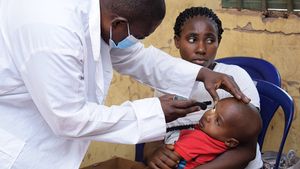There are an estimated 38 million people living with HIV/AIDS in the world today, with over 35 million people having died from complications of the virus since 1981. In 2020, 1.5 million people were newly diagnosed with HIV, despite us having all the tools needed to end this heinous pandemic.
On December 20, 2021, the FDA approved the first injectable treatment for HIV, Apretude, also known as Cabotegravir extended-release injectable suspension. Apretude is a major breakthrough for people wanting to prevent HIV transmission with pre-exposure prophylaxis (PrEP) and an important tool in the effort to end the HIV epidemic.
Since 2012 when the FDA approved Truvada (TDF/FTC), taken once daily for PrEP, we have had a major tool to help HIV-seronegative individuals prevent HIV infection. Due to potential toxicities with Truvada, a newer version with lower incidences of toxicity, Descovy (TAF/FTC), was FDA-approved for PrEP in 2019. There have been several inherent problems with the oral versions of PrEP:
- Truvada Toxicities: Truvada is a combination tablet containing emtricitabine (FTC) and tenofovir disoproxil fumarate (TDF), which has been associated with both renal and bone toxicities in both HIV-positive and HIV-negative individuals. TDF is the antiretroviral drug most commonly implicated in the development of kidney toxicities, including acute kidney injury, chronic kidney disease, and Fanconi's syndrome. In clinical practice, we have seen these toxicities in HIV-patients since 2002. There are even numerous class-action lawsuits filed regarding these renal toxicities, as well as bone toxicities [osteopenia, osteoporosis, and osteonecrosis], associated with TDF in HIV-positive individuals. So, it was inevitable that we would see these toxicities in healthy, younger, HIV-negative individuals taking Truvada as PrEP, and we were excited to see an alternative, Descovy (TAF/FTC), FDA-approved to substitute for Truvada.
- Descovy Toxicities: Descovy contains the combination of FTC with the "safer" tenofovir alafenamide fumarate (TAF). However, "safer" does not mean "safe", although both renal and bone toxicities are "less likely" with TAF when compared to TDF. Descovy, specifically the TAF, has been associated with weight gain and increases in cholesterol in HIV-positive individuals who were switched from Truvada to Descovy. I have seen occasional, but significant, weight gain in individuals using Descovy for PrEP, as well as for treatment of HIV.
- Insurance Considerations: since Truvada has a generic version available, insurance companies have become more and more resistant to approving Descovy for PrEP, unless kidney and/or bone toxicity has been documented to occur, leaving the HIV-negative individual vulnerable to develop these complications before being allowed to switch to the "safer" Descovy. Additionally, insurance companies may consider PrEP as a "specialty drug" and thus classify PrEP as a "tier 5 drug", the highest cost tier to which a drug can be assigned. This may not matter in individuals on commercial insurance, as copay cards exist to help reduce monthly copays and deductibles, but for many HIV-negative individuals of Medicare age, copay cards cannot be used and, with certain insurance carriers – "tier reductions" may not be allowed. Therefore, both Truvada and Descovy may be cost-prohibitive.
- Patient Compliance: it is well documented that compliance with daily PrEP intake wanes significantly through 48 weeks of use, thus increasing the possibility of acquiring HIV. It is true that Truvada can effectively be taken by cisgender men whose risk is through anal sex "On-Demand" [2 pills taken the day of unprotected sexual intercourse, 1 pill 24 hours later, and 1 pill 48 hours later, aka "2-1-1 PrEP"] instead of daily to reduce toxicities, exposure to the tenofovir, and cost. But the main complaint with "2-1-1" is that it must be planned.
So, it is obvious why an alternative to PrEP pills has been needed, and Cabotegravir comes with many advantages:
- Administration: instead of taking daily pills, Apretude is administered as an intramuscular injection once every 2 months after the initiation injections given one month apart. This incredible new development in HIV treatment offers patients a more convenient approach to their care. A monthly injection is appealing for both young adults who want more freedom in their treatment schedule and long-term survivors who are eager for a simplified plan of care.
- Safety: no bone or renal toxicities have been associated with the use of Apretude. Naturally, one should expect injection site reactions as a needle can cause pain, swelling, redness, etc. Headache, fatigue, fever, back pain, muscle aches and rash were more frequent with Apretude than Truvada.
- Compliance: the onus is now on the healthcare provider to increase PrEP adherence by scheduling individuals for their follow-up appointments before they leave the office and then assisting patients with compliance by reminding them about their upcoming appointments.
- Efficacy: when a new drug is being compared to an approved drug in strict randomized, double-blind controlled trials, it is not unusual for the new drug to be found "non-inferior" or equivalent or comparable to the approved drug, but Apretude was found to be statistically superior to Truvada. In the first trial of 4,566 cisgender men and transgender women who have sex with men, Apretude was associated with a 69 percent less chance of getting infected with HIV when compared to Truvada. In the second trial of 3,224 cisgender women, Apretude was associated with a 90 percent less risk of acquiring HIV when compared with Truvada.
As with all new FDA-approved drugs, approval by insurance companies will be the biggest initial barrier that will need to be overcome, but I am hoping that the superiority of Apretude will be its biggest advantage, i.e., "selling point", while seeking prior authorizations with prescription plans.
Unfortunately, our work is cut out for us during this COVID pandemic, which has thwarted previously comprehensive HIV testing efforts, resulting in more falling out of care/becoming lost-to-follow-up and has disrupted the supply chain of HIV medications. If EVERYONE with HIV is tested and diagnosed, EVERYONE can have access to HIV therapy that 100 percent prevents HIV transmission to uninfected individuals. BUT health inequities, stigma and discrimination remain the biggest barriers to ending one of the deadliest pandemics in the history of the world.
Over the years, we have made monumental progress in treating and destigmatizing HIV, but it’s important to recognize that it’s still a serious disease affecting millions worldwide. As more drugs are approved to help prevent HIV infection, we must do our part in educating the masses. It’s imperative that we make sure our community is both well informed and equipped to live a healthy life.
Dr. Gary Blick is an internationally renowned HIV/AIDS clinician, clinical researcher, lecturer, humanitarian, and the chief medical officer and founder of Health Care Advocates International, a public health and advocacy organization serving the LGBTQ+ community.
(Disclosure: Dr. Blick is also a speaker for ViiV Healthcare for their 2-drug HIV therapy, Dovato.)













































































